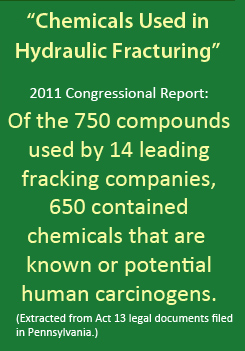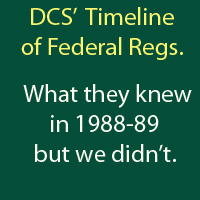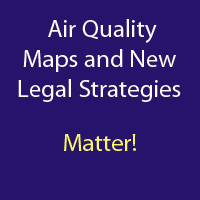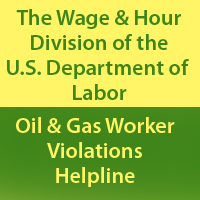Fla. DEP gives oil drilling company 9 demands
The nine demands levied against the Dan A Hughes Company by Florida’s Department of Environmental Protection (FLADEP) reflect the fundamental reasons Damascus Citizens for Sustainability created 1) the Natural Gas Health and Community Impacts Survey and 2) a protocol for transmitting individual and community impact data to the (federal) Agency for Toxic Substances and Disease Registry (ATSDR):
- DCS and ATSDR recognized that the Agency does not receive enough data from state authorities to initiate Public Health Assessments or to create a federal registry of reported natural gas extraction and production harms and impacts. (Demands # 2, 3, 5, 6, 9)
- Beyond illuminating individual and community health impacts, the Survey asks several questions that establish the nature of residents’ interactions with oversight agencies and the responses received.)
Other of the nine demands might establish,
- proximal cause of contaminations;
- who knew what when and what they did about it;
- whether or not protocols exist to enable reasonable oversight and enforcement to protect the public health and safety and whether or not fraudulent actions were taken to bypass existing oversight and enforcement protocols. (Demands # 1, 2, 3, 4, 5, 6, 7-9)
Demand #1 seems innocuous but DCS’ review of the Hancock Compressor proposal, for instance, questioned whether or not the pro forma nature of FERC approvals and consequent dismissal of public concerns and comments contravened the National Environmental Policy Act.
(From the ABC coverage…) The Florida Department of Environmental Protection is giving the Dan A. Hughes Company two weeks to comply with nine demands or face penalties.
A letter was issued to the Texas-based oil drilling company from Florida DEP Secretary Herschel Vinyard, Jr. on Thursday.
The letter outlines steps the company needs to take to restore public confidence in it’s Collier County projects.
The demands were stated as follows:
1. Publish dates and times that Dan A. Hughes will hold three public meetings to discuss and take public comment on your plans for the Collier-Hogan site and future operations in Collier County.
- Confirm whether Hughes took samples of the flowback material that was trucked off the Collier-Hogan site prior to June 23, 2014, when DEP arrived to inspect the site. If samples exist, immediately provide those samples to DEP. If Hughes did not take samples of the flowback material, prior to trucking off-site, provide an explanation as to why and who, specifically at Dan A. Hughes, made the decision not to sample these materials and why DEP was not notified of this action.
- Publicly announce media and public access to your operations to ensure that the previous violations are not ongoing.
- Publicly commit to testify before the County Commission’s July 8 meeting to discuss your current practices and long term plans.
- Provide an explanation of the agreement between Dan A. Hughes and the facility that agreed to accept the flowback material to provide full assurance that this material is being disposed of appropriately to safeguard the public. Also include a copy of the renewed pretreatment permit issued by Miami-Dade County, as the current permit you provided to DEP expired on May 31, 2014.
- Provide the revisions of the groundwater monitoring plan as required by DEP to address the deficiencies previously identified by the Department. This would include a prompt schedule of when Dan A. Hughes will be conducting on-site testing.
- Provide the names and qualifications of the individuals at Dan A. Hughes who are responsible for implementing the requirements of this Consent Order and ensuring compliance on-site. We are aware that you have released the environmental compliance consultant and project engineer who were working with DEP on the implementation of the Consent Order, and we ask that you provide an explanation for the release of these individuals. It is important that we have the information necessary to determine the expertise of those employed by Dan A. Hughes to protect the public.
- Provide the name of your recommended independent third-party expert that will conduct the study under the Consent Order. The Consent Order required Dan A. Hughes to provide a third-party expert acceptable to DEP and a scope of work within 60 days, which was June 7, 2014. The independent third-party expert you initially proposed was rejected by DEP because, as a prior contractor for Dan A. Hughes, that company (Stantec) had a clear conflict of interest. The independence of the third-party expert is critical to ensure unbiased information.
- The Company must provide every 10 days a status report as to the utilization of its Spill Prevention and Cleanup Plan to ensure that proper safety mechanisms are in place. Aerial photographs and on the ground assessments have exposed oil sheen on the ground that are allegedly the result of Hughes’ techniques of spraying oil into truck tanks. It is important to know whether or not this activity is part of the Spill Prevention and Cleanup Plan.
The letter states that the stipulations are non-negotiable. The Dan A. Hughes Company has until July 15 to complete the demands.
For background on Dan A. Hughes in Collier County, Florida, you can begin here.
Environmental statutes and FERC have failed “We the People” but brilliant legal strategies are winning based on Constitutional and tort claims, climate change, and the obligations of local governments and citizens’ rights to control their own local destinies. In the long run, we must ensure that the rights of communities and residents are extended to oil and gas workers who are being harmed and killed on the frontlines of Gas Land.
For an in-depth chronology of the gutting of Federal environmental regulations, please see our Timeline which includes “What They Knew in 1988” (OSHA and LA 1988 and 1989) and a 2011 Committee report that illuminates the damage Congress caused by enacting the 2005 National Environmental Policy Act.
-
NY’s top court says towns can ban fracking. Supports Municipal Home Rule!
In its majority opinion, the Court stated, “We are asked in these two appeals whether towns may ban oil and gas production activities, including hydrofracking, within municipal boundaries through the adoption of local zoning laws,” Associate Judge Victoria Graffeo wrote in the majority opinion. “We conclude that they may because the supersession clause in the statewide Oil, Gas and Solution Mining Law (OGSML) does not preempt the home rule authority vested in municipalities to regulate land use.”
(Poster’s note: New York’s municipalities have been awaiting an appellate level decision for three years. During that time, municipalities around the State have been banning “oil and gas production activities” or they have been reluctant to do so in the face of threatened lawsuits. Although this decision is open to appeal, all New Yorkers, no matter their stance on fracking, should celebrate this affirmation of local control. Read the Court’s opinion here.)
- This successful challenge to the Federal Energy Regulatory Commission’s (FERC) refusal to consider the cumulative impacts of its approved projects is huge! It’s been the major stumbling block to appealing the Commission’s entire approval process! Major kudos to the Delaware Riverkeeper Network, the NJ Sierra Club and New Jersey Highlands Coalition:
In a decision issued June 6, 2014, the United States Court of Appeals for the District of Columbia, ruled that the Delaware Riverkeeper Network, the NJ Sierra Club and New Jersey Highlands Coalition were correct in their legal challenge to the Tennessee Gas Pipeline Company’s Northeast Upgrade Project and ordered additional analysis and review. The Court stated: “On the record before us, we hold that in conducting its environmental review of the Northeast Project without considering the other connected, closely related, and interdependent projects on the Eastern Leg, FERC impermissibly segmented the environmental review in violation of NEPA. We also find that FERC’s EA is deficient in its failure to include any meaningful analysis of the cumulative impacts of the upgrade projects. We therefore grant the petition for review and remand the case to the Commission for further consideration of segmentation and cumulative impacts.” – (Read more….)
- “Does a community’s right to self-governance trump the rights of corporations? The county ordinance’s basic aim is to protect the water supply in a parched region of a drought-stricken state, but it also contains a bill of rights for the environment, which argues that natural ecosystems ‘possess inalienable and fundamental rights to exist.’” (Read more….)
- In Pennsylvania where the challenges continue to Act 13 which threatened all local zoning prerogatives, rights and obligations. (These Act 13 documents include many documents submitted during the Discovery Phase of the lawsuit!)
“While the suit centers on fracking, it seeks to protect the citizens’ right to self-governance under the Community Bill of Rights. The residents allege that the Colorado Oil and Gas Act and the industry’s enforcement of it violate that right to local self-government under the U.S. Constitution…. ‘This class action lawsuit is merely the first of many by people across the United States whose constitutional rights to govern their own communities are routinely violated by state governments working in concert with the corporations that they ostensibly regulate,’ said Thomas Linzey, Esq., executive director of the Community Environmental Legal Defense Fund, which helped craft Lafayette’s Community Bill of Rights.” (Read more….)
- In the US Supreme Court which upheld the Environmental Protection Agency’s “Cross-State Air Pollution Rule.”
- In Texas where a jury in Dallas awarded $2.925 million to plaintiffs Bob and Lisa Parr, who sued Barnett shale fracking company Aruba Petroleum Inc. for intentionally causing a nuisance on the Parr’s property which impacted their health and ruined their drinking water. (See more…) (Poster’s comment: This is huge. Bypass FERC. Bypass statutory exemptions. Go to “Intentional Tort.” Truly great news from this jury trial. And no surprise, DeSmog Blog is on top of it.)
- In Illinois where Farmers Insurance believes climate damage is foreseeable, not an “Act of God.” “A major insurance company is accusing dozens of localities in Illinois of failing to prepare for severe rains and flooding in lawsuits that are the first in what could be a wave of litigation over who should be liable for the possible costs of climate change. Farmers Insurance filed class action lawsuit last month against nearly 200 communities in the Chicago area for failing to prepare for flooding. The suits argue towns should have known climate change would produce more flooding.”
Daily Air Quality Maps. View by USA, State, Region, Zip Code!
I’m probably the last person in the fracking world to find this but in case anyone else is interested, here’s a terrific link to daily air quality maps. You can look at your specific zip code, at an entire region, etc. (Follow link….)
Obviously, these maps are excellent resources for natural gas industry workers and folks living near natural gas industrial activities, especially in light of recent jury awards.








Follow Us!